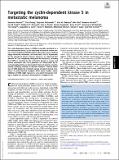Targeting the cyclin-dependent kinase 5 in metastatic melanoma
Author(s)
Sharma, Samanta; Zhang, Tian; Michowski, Wojciech; Rebecca, Vito W; Xiao, Min; Ferretti, Roberta; Suski, Jan M; Bronson, Roderick T; Paulo, Joao A; Frederick, Dennie; Fassl, Anne; Boland, Genevieve M; Geng, Yan; Lees, Jacqueline A; Medema, Rene H; Herlyn, Meenhard; Gygi, Steven P; Sicinski, Piotr; ... Show more Show less
DownloadPublished version (2.049Mb)
Publisher Policy
Publisher Policy
Article is made available in accordance with the publisher's policy and may be subject to US copyright law. Please refer to the publisher's site for terms of use.
Terms of use
Metadata
Show full item recordAbstract
© 2020 National Academy of Sciences. All rights reserved. The cyclin-dependent kinase 5 (CDK5), originally described as a neuronal-specific kinase, is also frequently activated in human cancers. Using conditional CDK5 knockout mice and a mouse model of highly metastatic melanoma, we found that CDK5 is dispensable for the growth of primary tumors. However, we observed that ablation of CDK5 completely abrogated the metastasis, revealing that CDK5 is essential for the metastatic spread. In mouse and human melanoma cells CDK5 promotes cell invasiveness by directly phosphorylating an intermediate filament protein, vimentin, thereby inhibiting assembly of vimentin filaments. Chemical inhibition of CDK5 blocks the metastatic spread of patient-derived melanomas in patient-derived xenograft (PDX) mouse models. Hence, inhibition of CDK5 might represent a very potent therapeutic strategy to impede the metastatic dissemination of malignant cells.
Date issued
2020Department
Koch Institute for Integrative Cancer Research at MIT; Massachusetts Institute of Technology. Department of BiologyJournal
Proceedings of the National Academy of Sciences of the United States of America
Publisher
Proceedings of the National Academy of Sciences